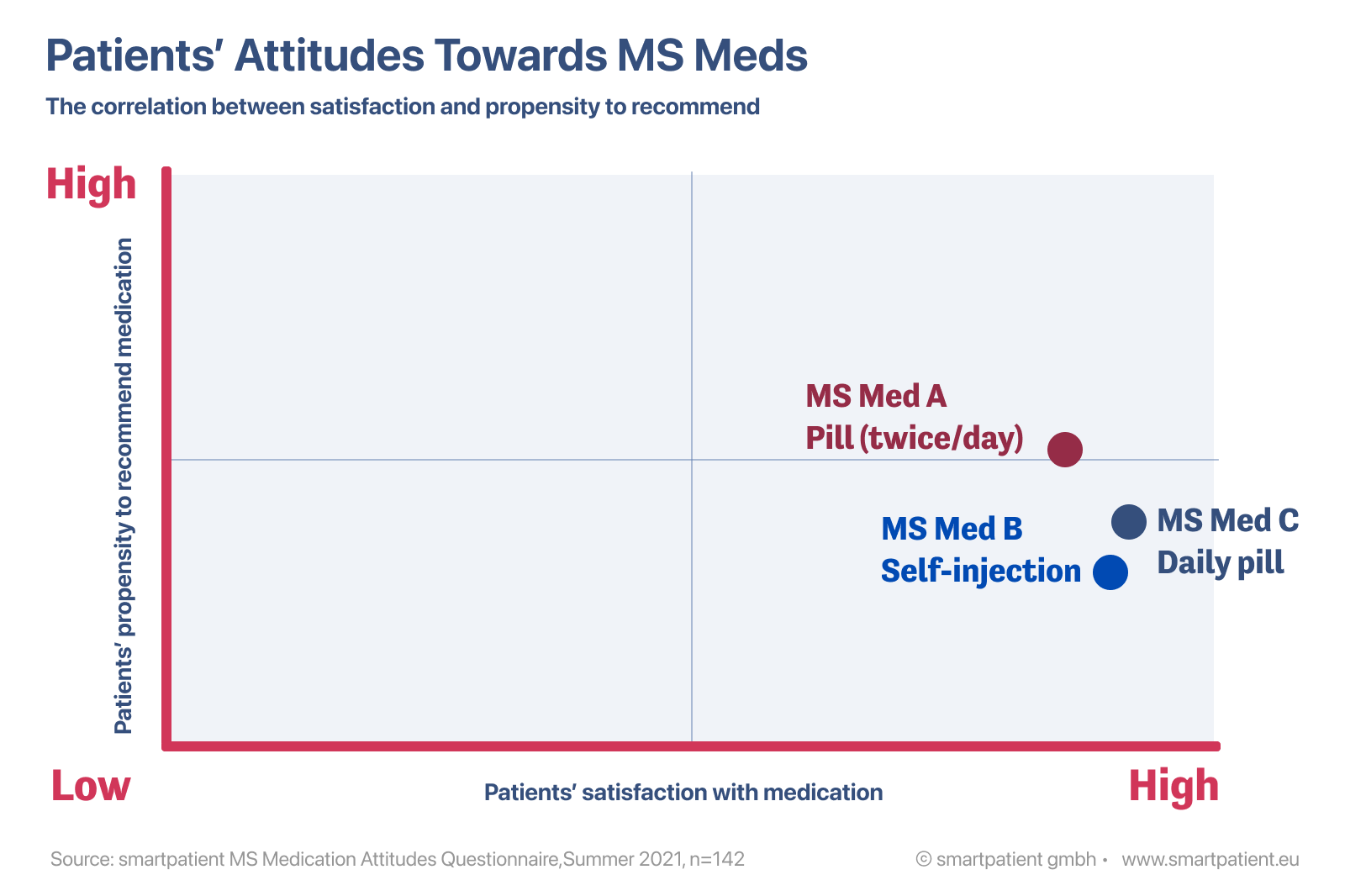Promoter Scores in MS: When Patients Talk Well About Their MS Medication
A survey taken by a sample of the 7,000+ MyTherapy users found that treatment satisfaction and users’ propensity to recommend their MS medication do not always correlate, creating a double dividend for meaningful patient engagement: Increased patient confidence and persistence AND increased share of voice towards patient and HCPs

- Many users taking multiple sclerosis medications would not recommend it to others with the same diagnosis – despite being satisfied with their treatment
- Across products, patients’ propensity to promote differs significantly, despite similar satisfaction levels, suggesting additional factors to influence patients’ perception of their MS drug
- New approaches in patient engagement create the opportunity to not only support adherence and persistence, but help the association between satisfied patients and a product’s brand
Over 7,000 people living with multiple sclerosis use MyTherapy to manage their treatment, including both MS drugs and a wide range of additional medications. Having such a wide and diverse userbase grants us the opportunity to gather information that can shine a light on users’ needs and attitudes. Among the insights from our latest survey, we saw a disparity between the satisfaction users had in certain medications and their propensity to recommend them to friends or family members should they receive the same diagnosis. What can pharma do to ensure patients associate their satisfaction with the product and share this information back with their prescribers and their offline and online patient communities?
MS User Survey: What Did We Ask?
In a broad survey taken among a sample of MyTherapy users living with multiple sclerosis, we asked questions regarding users’ attitudes towards their MS medications. Among the respondents, we had users taking the majority of the biggest MS drugs. As well as being asked how satisfied users are with their treatment, respondents were asked whether they would recommend that a friend or family member ask a doctor about their medication should they receive the same diagnosis. While one might expect a direct correlation between the two, that was not always the case.

The above graph demonstrates a mismatch between satisfaction and propensity to recommend among the three most common MS medications taken among respondents. Curiously, users of Med A reported the lowest levels of satisfaction but the greatest propensity to recommend it. Similar oddities were found throughout the survey results.
Even when results are filtered to show only respondents who said they are satisfied with their treatment, just 55% of Med A and Med C users would recommend it and only 38% of Med B users.
The likely implication: For prescribers, Med A will seem particularly worthwhile considering. With the respective patients being vocal about their satisfaction, doctors', caregivers', and other patients' perceptions will likely be positive.
The upshot for pharma? Providing an effective treatment may result in satisfied patients. For this satisfaction to shine back on the brand, however, pharma needs to do more.
Why Pharma Should Care about Patient Attitudes
While it would be easy to dismiss such results as quirks, the fact is that in the digital world in which we now live, patients are connected with one another like never before and are increasingly influential in treatment decisions. Pharma still considers rather doctors to be their customers than patients. Yet, the typical model of unidirectional doctor-to-patient communication is no longer the de facto one, and patient attitudes towards different medications can have a direct impact on the prescriptions doctors make.
Pharma’s ability to build consumer brand awareness through traditional marketing channels is restricted in the vast majority of countries around the world. However, it is not difficult to believe that an effective patient engagement channel – through which pharma can deliver patient support and education; gain feedback and insights; and benefit from real-world safety insights – can improve the perceived value of a treatment among users. This, combined with the generally high satisfaction levels reported in the survey, is a recipe for superior brand recognition in the eyes of patients by offering a more comprehensive package that meets a wider range of needs.
This is not necessarily news to those in pharma. Patient engagement is a phrase that has been used tirelessly in recent years; yet, the majority of the industry’s attempts at digital patient engagement programs – not least in the MS space – have failed to gain significant user adoption.
And while pharma has repeatedly attempted in vain to get users to adopt their disease- and drug-specific offerings, MyTherapy’s userbase has grown rapidly, as demonstrated by the number of users managing MS treatment. Considering this situation led to something of a lightbulb moment: if users are not going to adopt new programs, why not allow pharma to engage with them on the program they already use every day?
How Innovation in Patient Support can Help to Shape Patient Attitudes
Patient engagement has the potential to not only generate value through adherence and persistence but also shape the perception of medications with patients and their doctors. Delivering on this promise, however, requires adoption - something that historically, almost all patient support programs have struggled with. For a reason: The offerings were largely product-focused, thereby providing value only to a very narrow audience. To make things worse, getting access required lengthy enrollment procedures.
With our latest programs, we decided to turn things around: Instead of starting from a product, we are starting from adoption. Instead of limiting access to product-specific information, we are making as much value as possible available to as many patients as possible. Starting with MyTherapy for MS, we enable patients living with specific diseases like MS to do both, manage their entire treatment for all their diseases AND access a range of features and content designed specifically for people living with multiple sclerosis.
At the time of launch, we were already counting more than 7,000 people living with MS as users MyTherapy platform
Beyond that, we will work with pharma partners to offer an additional layer of drug-specific functionalities for users taking particular treatments. For pharma, this opens the door to engaging with patients on a program they already use, along with greater opportunities to educate the MS community and gain insight from our patient panel.
Already we are seeing a positive response to this novel approach within the pharma industry, affirming our belief that this approach can finally crack the patient engagement nut. If you want to learn more about MyTherapy for MS – or discuss how the approach can apply to other conditions – don’t hesitate to get in touch



